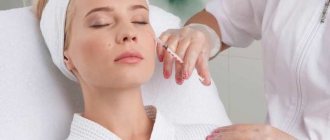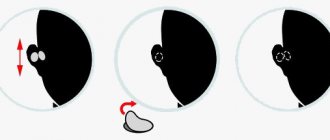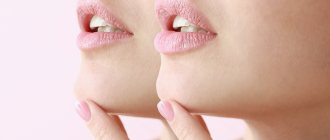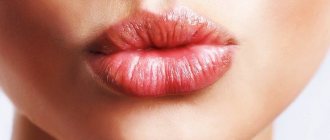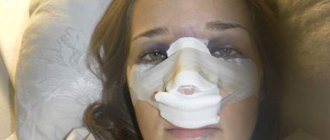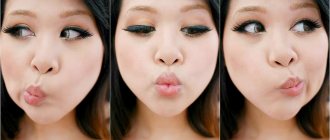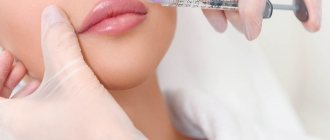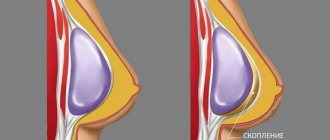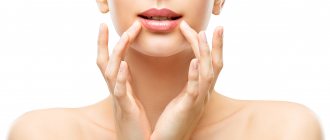You wanted to enlarge your lips a little, why not. Now this is a simple procedure with a minimal recovery period. You sign up for a consultation, and the doctor gives recommendations, among which it is not recommended to drink alcohol either before or after the procedure. Why?
The main drug for lip correction is hyaluronic acid. It helps maintain youthful skin by retaining moisture in the deeper layers of the skin. Alcohol, on the contrary, makes the skin dry, dull and flabby. Photos before and after lip augmentation.
Photo from the website of D.R. Grishkyan. There are contraindications, specialist consultation is required
How does hyaluronic acid work?
contained and produced in the human body. Included in various fabrics. This is one of the most important components of many biological fluids (synovial fluid, saliva, etc.). Takes part in cell division and migration.
Plays an important role in hydrodynamics, tissue and skin regeneration. Due to its viscous structure, HA is able to capture and retain water molecules, thereby providing a high-quality moisturizing effect.
Therefore, it is recommended for such cosmetic problems as:
- dry skin;
- peeling;
- loss of firmness and elasticity;
- sagging, wrinkles.
In cosmetology, it is widely used as a safe filler to replenish volume in certain areas of the face and body (correction of the shape of lips, nose, chin, cheekbones, filling wrinkles, etc.).
Several factors influence the amount of this substance in the body to decrease.
It is known that when the epidermis is overexposed to UV rays, it becomes inflamed (sunburn). In the cells of the dermis, the production of HA is suspended, the rate of its degradation (disintegration) increases, which serves as a prerequisite for premature aging of the skin.
Therefore, if a woman wants to preserve the youth of the epidermis for as long as possible, then it is not recommended to get too carried away with tanning.
Also, the concentration of the substance decreases with age. The skin begins to lack this component after 30-35 years.
After reaching 45 years of age, the process of decreasing concentration and synthesis of HA accelerates exponentially. By the age of 55, the amount of the substance in the body is halved.
Injections are recommended as soon as the skin begins to lose its previous tone, dryness, sagging, wrinkles, and loss of volume appear in certain areas of the face, including lips.
But you need to follow the recommendations of the cosmetologist, in particular regarding alcohol.
How much alcohol should you not drink after lip augmentation with hyaluronic acid, and what interval is not recommended to drink before contouring, read in the section below.
Scientific explanation
Hyaluronic acid fillers are truly incompatible with alcohol, and there is scientific evidence for this.
Alcohol (as well as nicotine, poor diet, exposure to ultraviolet rays) is one of the reasons for the breakdown of hyaluronate. Under the influence of these reasons, the synthesis of hyaluronic acid is disrupted, its quantity and structure become abnormal. And this process is inevitable. The more alcohol consumed, the worse it is for hyaluronic acid. Alcohol destroys the supply of essential vitamins C and E, which help collagen production. It is the skin with a sufficient level of collagen that looks young, firm, nourished and elastic, and does not require any cosmetic correction for a long time.
Thus, the effect of the procedure for introducing hyaluronic acid into the skin while simultaneously being exposed to alcohol certainly cannot be positive.
Why is alcohol prohibited after lip augmentation? (4 consequences)
HA does not interact with ethanol. It is biocompatible with the tissues of the human body, non-toxic, and does not cause unwanted reactions when properly administered.
Why then do experts advise limiting alcohol consumption after lip augmentation and before the procedure? It is ethanol that plays the main negative role here.
It is recommended to avoid alcohol and NSAIDs before and after the procedure as they can thin the blood and increase bruising and swelling.
Anesthesiologist Monica Soni
Swelling
When drinking alcohol, the body quickly loses water. Many times more than he receives. In this regard, the next day, many note significant weight loss - this is due to the intensive removal of fluid from the body.
Thirst occurs, which indicates that it is necessary to restore hydrobalance.
A person consumes a large amount of water, it is retained in the tissues, which is why a person’s weight not only returns, but also takes with them a couple of additional kilograms.
Slowing down regeneration and healing processes
Intense loss of fluid affects the rheological parameters of the blood. Due to a lack of moisture, platelet aggregation (sticking together) increases.
The risk of blood clot formation increases, which can clog part or all of the lumen of the vessel, which will impair the flow of blood to the tissues, including the lip area.
Also, alcoholic drinks first dilate blood vessels, and when removed from the body, they cause spasm and increase blood pressure, which also negatively affects blood circulation.
This means that the injection site will lack oxygen, vitamins, nutrients and other microelements for full recovery due to impaired blood flow.
Remember to avoid alcohol 24 hours before your injections, and aspirin and ibuprofen for the week before your injections. Otherwise, the rehabilitation process will be delayed.
Plastic surgeon Aldo Guerra
Increased risk of infection and tissue suppuration
The above consequences are not all the negative processes that occur in the body due to alcohol consumption.
Alcohol reduces the activity of the immune system. This is accomplished by reducing the concentration of white blood cells - macrophages - in the blood.
They provide the body's defense against infections: they absorb dangerous bacteria, viruses, and the remains of damaged cells. They will process antigens into the most immunogenic form to induce an immune response.
This helps cleanse damaged skin areas from pathogenic microorganisms.
Macrophages play an important role in the fight against intracellular parasites, participate in the destruction of tumor cells, and the synthesis of regulatory substances and enzymes that promote recovery.
Accordingly, with a deficiency of such cells, the immune response to pathogenic microflora weakens, which means that the likelihood of infection, abscess formation (suppuration) and even tissue necrosis increases.
Tissue injury during contouring
HA injections are a minimally invasive intervention that involves pinpoint puncture of tissue and injection of filler.
As a response to such manipulation, tissue swelling, pain, and hematomas develop. And this is the norm.
And if we imagine that all of the above-mentioned negative effects of alcohol are added to this post-procedural state, then the healing process in 85% of cases takes longer than normal, is more painful and difficult for the patient.
An already injured area that has undergone contouring will be deficient in oxygen and nutrients due to blood thickening and poor circulation, which means recovery will be lengthy.
The risk of infection will increase, and treatment with antiseptics may be ineffective. The swelling will also last much longer.
Alcohol before lip augmentation
Drinking alcohol immediately before the procedure has a negative effect on the results of a cosmetic procedure. The harmful properties of alcohol can affect both the general condition (dizziness, weakness, nausea) and the internal condition (blood clotting disorders, deterioration of skin regeneration).
If you drink strong drinks before the procedure, the healing process may drag on indefinitely. In addition, the results from the introduction of hyaluronic acid may differ from those expected or be negative.
Many problems with lips after their enlargement are caused by alcohol. Alcohol dilates blood vessels and increases blood flow, causing hyaluronic acid to be unevenly distributed in the cavity being filled, thus creating an “accordion” effect.
Possible negative consequences of drinking alcohol after lip augmentation
There is always a possibility of side effects and complications, even without drinking alcohol. This may be severe swelling, erythema, ulcers in the injection area, or an unsatisfactory aesthetic result.
When fillers are introduced superficially, you can notice their visual contouring. The drug seems to protrude outward, the contour of the lips is uneven and lumpy. Sometimes the gel shines through and forms gray, purple, or blue spots.
This condition is not dangerous, but aesthetically unattractive. To return to its original appearance, you will either need to wait several months for the drug to dissolve naturally, or inject hyaluronidase.
If the gel is injected too deeply, it can migrate into neighboring tissues and distort the proportions of the face.
Choosing a competent, experienced and certified specialist who has been working in the clinic for more than one year will help prevent such consequences. Home treatments should not be considered at all.
Migration of the gel is also possible if the patient rubs or massages the injection area, as well as due to the individual structure of soft tissues.
As for the complications associated with contour plastic surgery when there is ethanol in the blood, then, as indicated above, these include:
- Severe swelling, hematomas, hemorrhages, which will last longer than if the patient did not drink alcohol.
- High probability of infection due to a decrease in the concentration of macrophages that protect against infections.
- Granulomas, fibrosis.
If alcohol consumption cannot be avoided
Anything can happen in life. Most often, women resort to the services of a professional cosmetologist before some significant event in their lives, for example, a meeting of former classmates or classmates, a relative’s or their own anniversary, a wedding. Such events, of course, are not complete without strong drinks or at least champagne, and not sipping a little in such a situation would simply be impolite and indecent. There is only one way out to ensure that the consequences do not turn out to be disastrous: limit yourself to as little alcohol as possible, because one glass of a good drink will not have any consequences for the fillers and the patient’s skin. You should also try to choose low-fat and unsalted foods as snacks, so as not to aggravate the negative effects on the body as a whole. In addition, if you are already planning to drink alcohol, you need to at least avoid other prohibited actions after the introduction of fillers: do not apply a ton of cheap foundation to uncleansed skin, do not go to the bathhouse/sauna, solarium and swimming pool, do not fall asleep with your face in the salad (pillow).
Question answer
Caffeine does not affect fillers.
There is not a single study confirming the harm from coffee associated with lip enlargement. Doctors advise not to eat spicy and salty foods, as they retain fluid, which will increase swelling after the procedure. No, this procedure is contraindicated. You need to be careful, because massage can lead to filler migration.
You need to understand that any cosmetics can lead to allergies. Also, applying lipstick will slow down the rehabilitation process; wounds will take longer to heal. It all depends on individual characteristics. But doctors usually advise refraining from using lipstick for 2-3 days. In the future, you need to look at the condition of your lips.
Swelling in the filler area
Cold compresses
The morning after the procedure, if a person drank alcohol, he will see the consequences in the mirror - swelling. It's not scary, and you can try to get rid of them yourself. Firstly, you can drink more water, eliminate salt and salty foods, eat more fruits and vegetables, this will help remove excess fluid and replenish its deficiency, if any. Secondly, you can apply cold compresses to swollen areas. If all else fails, you can drink diuretics or teas. There is no need to sound the alarm if the body was initially prone to the formation of edema, you just need to wait. If this does not help and the swelling does not subside for a long time, you need to consult a cosmetologist and make an appointment for a second appointment. The filler may need to be removed using hyaluronidase. Thus, the effect of alcohol on fillers is definitely negative. The main conclusion that can be drawn is that the optimal solution would be to give up drinking both before and after the procedure so that its effect lasts for a long time.
Why do some people develop side effects and others not?
In cosmetology practice, there have been various cases and consequences of drinking alcohol before and after lip augmentation.
For some women, drinking alcohol did not cause any negative health reactions. This may be due to the low dosage of drinks consumed or the small volume of drug administered during the procedure.
- In the first case, due to the low dosage, the body quickly processes ethanol and removes it from the body. A fast metabolism can also contribute to this. In this regard, negative manifestations simply do not have time to develop, the girl feels good, and the tissue healing process proceeds in accordance with the norm.
- In the second case (with a small injection of the drug), tissue trauma is minimal. They are not overloaded with the new substance, which means it is distributed faster and does not cause adverse reactions.
Each case is individual. Here you should also take into account the rate of tissue healing, whether the patient has any abnormalities in the hemorheological profile or blood lipid spectrum.
It is impossible to say exactly how your body will react to alcohol. Drinking a glass of wine after the procedure, you risk encountering trouble.
Plastic surgeon Aldo Guerra
There may be some disturbances in the functioning of the endocrine system. For example, in diabetes mellitus there is a low rate of tissue healing.
This disease is a contraindication to the procedure. And if you neglect it and additionally drink alcohol after lip augmentation, then negative reactions will not keep you waiting.
In general, ignoring any restrictions on lip shape correction in combination with alcohol significantly increases the risk of developing unwanted reactions.
If, in the absence of contraindications, there is still a chance that the recovery process will go quickly, then in combination with alcohol, negative consequences are almost inevitable.
Alcohol and skin
Alcoholics are not beautiful and prosperous, their faces do not shine with youth and health. Strong drinks have a number of negative effects on the body:
Dry skin
- Alcohol causes swelling and the face takes on a swollen appearance.
- The skin dries out as general dehydration occurs due to the diuretic effect.
- The skin loses turgor and begins to sag, jowls and double chins appear.
- Alcohol dilates blood vessels and over time, noticeable capillaries remain on the face forever, the face quickly turns red.
- Alcohol clogs the liver, which causes rashes and acne.
- Due to alcohol abuse, a person experiences problems sleeping, which causes dark circles under the eyes.
- Wrinkles appear much earlier than in non-drinkers.
- When drinking alcohol, the complexion becomes pale and dull, and over time turns yellow, as the liver is in poor condition.
- Hormonal balance is disrupted; in women, the skin may become rougher, comedones and an oily sheen appear.
Contraindications for lip augmentation
The procedure is not recommended if the patient is menopausal or menstruating.
At this time, the woman’s hormonal background is unstable and it is unknown how long the resulting cosmetic effect will last.
If the integrity of the epidermis is damaged in the injection area, there are inflammatory processes, tumor formations, then it is better to postpone the procedure for a more favorable period.
Direct contraindications are listed below.
CONTRAINDICATIONS
- blood clotting pathologies;
- autoimmune diseases;
- tendency to tissue scarring, fibrosis;
- oncological tumors.
When can you use it and when can you not?
How long should you drink alcohol after lip augmentation? Doctors and cosmetologists recommend refraining from drinking strong drinks a week before injections, and from low-alcohol drinks at least 3 days before. Experts give the same recommendations immediately after the procedure. At least 2 days must pass after the session, after which you can drink alcohol.
When you drink alcohol, you are not as careful and therefore are much more likely to touch your face and put pressure on it, which can cause the filler to migrate into unwanted areas.
Cosmetologist Mariusz Gajewski
Additionally, after the injection and before it, you should limit the consumption of salty, spicy, and smoked foods - this will help reduce the severity of swelling.
You need to wash your face very carefully. Do not visit baths, because at high ambient temperatures, blood vessels dilate, blood flows to the treated area, and swelling and pain increase.
The use of decorative cosmetics and aggressive care products (peelings, etc. in the lip area) is prohibited until complete healing, so as not to injure the tissues or cause infection.
Alcohol versus beauty
Very often, the fair half of humanity makes lip correction as a “gift” for the holidays or before a vacation. But most people don’t think about whether they can drink alcoholic beverages after the procedure. With any injection, possible reactions may include pain, bleeding, redness, swelling, or infection. Therefore, special precautions should be taken to minimize side effects.
Alcohol and hyaluronic acid have a complex relationship. Before enlarging your lips using hyaluronic acid, you should consult a dermatologist about the procedure itself and its contraindications. Very few people ask a cosmetologist about alcohol, although in vain. The question of the compatibility of fillers and alcohol is quite serious. To be on the safe side, many cosmetologists do not recommend drinking strong drinks even a few days before the correction. However, no one really explains why you shouldn’t drink alcohol before lip augmentation.
Although lip augmentation procedures are extremely safe and have very few side effects, their combination with alcohol-containing drinks can have a detrimental effect on the results
In principle, alcohol is one of the main reasons leading to the need for cosmetic rejuvenation procedures. Even the lightest alcohol can disrupt the natural synthesis of hyaluronic acid, which leads to dehydration of the dermis and the appearance of early wrinkles. Therefore, even if you do not inject fillers into the subcutaneous layers, it is worth giving up drinking strong drinks in order to preserve your natural beauty for many years. Have you ever paid attention to alcoholics? These people look older than their years, they have severe swelling and deep wrinkles on their faces.
Reviews on forums
There is a lot of debate on forums regarding whether it is possible to drink alcohol after lip augmentation with hyaluronic acid or filler.
Some argue that drinking alcohol will not affect your well-being, the healing process, or the aesthetic result of the procedure.
Others say that recovery and reduction of swelling takes almost a month, and this despite the fact that 2 weeks is considered the norm.
If the patient ignored the cosmetologist’s recommendations and drank alcohol after or before lip augmentation, the consequences could be very unpleasant.
Alcohol after filler injections
A good professional cosmetologist will definitely give the patient a written reminder about what he can and cannot do after the filler procedure, because health and beauty are the ultimate and very important goal for both of them. And in this memo there will certainly be a point about the effects of alcohol. Immediately after the procedure, it is best to avoid drinking alcohol for at least a couple of weeks. This will get rid of troubles such as edema and swelling in the area where fillers were injected, prolonged painful healing, and will speed up the body’s “acclimation” to the injected gel. Procedures for the introduction of hyaluronic acid are relatively expensive, so in order to avoid wasting the money spent, you can sacrifice some of your pleasures or temporarily postpone them. A professional cosmetologist must warn the client that the effect after contouring if alcohol is consumed will be unpredictable; it would be better to give up drinking.
Expert opinion
- Cosmetologist
- Surgeon
Deborah Longwill
practicing dermatologist-cosmetologist
With any injection there are risks such as pain, bleeding, bruising, redness, swelling, and infection. We take special precautions to minimize these risks, such as using pain-free techniques. We also treat bruises with laser the very next day. Bruising usually goes away within two weeks if left untreated. After laser treatment they usually go away within 1-3 days. I always advise avoiding excessive alcohol consumption for 48 hours after injections for safety and to reduce the risk of bruising
Aisha Baron
plastic surgeon
There is no real contraindication to drinking alcohol after receiving Botox or filler.
But alcohol thins your blood and increases the likelihood of bruising and swelling. Of course, the healing process may proceed in accordance with the norm, but no one can give a prognosis for the post-procedure period.
The likelihood of a long recovery is high, so it is better not to risk your health and appearance and refrain from using it or, as a last resort, reschedule the procedure for a more suitable period.
Possible complications caused by alcohol
Beauties who love to drink should know: alcohol can cause the procedure to be ineffective. The filler simply will not work, there will be no result, the lips will remain the same, the nasolabial folds and “puppets” will also not disappear. They may panic, get angry, and rush to write negative reviews about the cosmetologist, but they will only have themselves to blame for this, because they always warn about the dangers of alcohol after the injection of fillers. But a lot of other dangerous things can happen, including the formation of tumors, inflammation and asymmetrical lips. So, the likely consequences of a combination of injections and strong drinks:
Hematomas and bruises
- hematomas and bruises in the injection area;
- severe swelling of the skin;
- insufficient effect of the procedure, the need to repeat it;
- allergic reaction;
- short-term preservation of the result of the procedure;
- development of inflammation and gel rejection.

